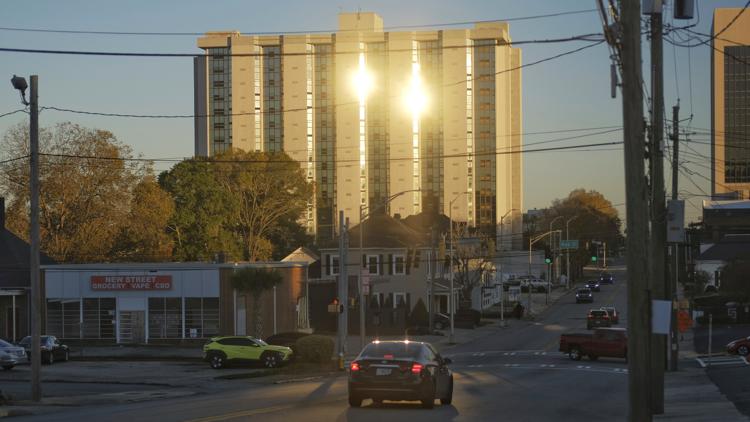MACON, Ga. — One Georgia city will welcome 2025 with a larger-than-average bang.
The Macon-Bibb County Commission approved a plan to implode a vacant 16-story hotel at midnight on New Year's Eve.
In a federal bankruptcy proceeding, Macon-Bibb County spent $4.5 million last year to buy the hotel. Local news outlets report that the city-county agreed on Tuesday to hire a demolition firm to blow up the building at a cost of up to $2.6 million.
“We acquired this property to blow it up,” Macon Mayor Lester Miller told WMAZ-TV.
The hotel was opened in 1970, and its guests included Elvis, but it was never a financial success.
Most notably, the New York Banking Department seized the hotel in 1991, saying it was one asset in a fraud and money-laundering scheme linked to the Bank of Credit and Commerce International. The bank was accused of helping Saddam Hussein hide Iraqi oil profits and backing Oliver North’s arms deals with Iran.
The hotel, last operating as the Ramada Plaza, is on the northern edge of downtown Macon, a block from the Ocmulgee River. It has stood vacant since it closed in 2017.
The building was designed by noted architect Morris Lapidus, who is famous for Miami Beach hotels, including the Fontainebleau. But Miller said it isn’t structurally sound and can’t be renovated.
“We’re gonna spend a little money to tear that thing down," Miller said. “But what you’ll see that’s replacing that will be 100 times of what it’s doing right now.”
The mayor said the city hasn't decided how the land will be used but that the site could contribute to a larger redevelopment of Macon's riverfront.
But first, the contractor and the city have to manage the demolition.
Russ Henry, a member of the vestry overseeing Christ Episcopal Church, less than two blocks from the hotel, said the congregation is worried that any explosion could damage the church's historic sanctuary built in 1851.
Henry said the church doesn't oppose the demolition plan but asked the local government to move cautiously, noting the church has historic stained glass windows and is celebrating its 200th anniversary next year.
“It’s an eyesore to the whole community, we would love to have something else there,” Henry said. “We just want to make sure that our church doesn’t get blown up on our bicentennial.”
Miller said nearby property owners will be contacted for discussions in the coming weeks, saying he wants to protect them.



